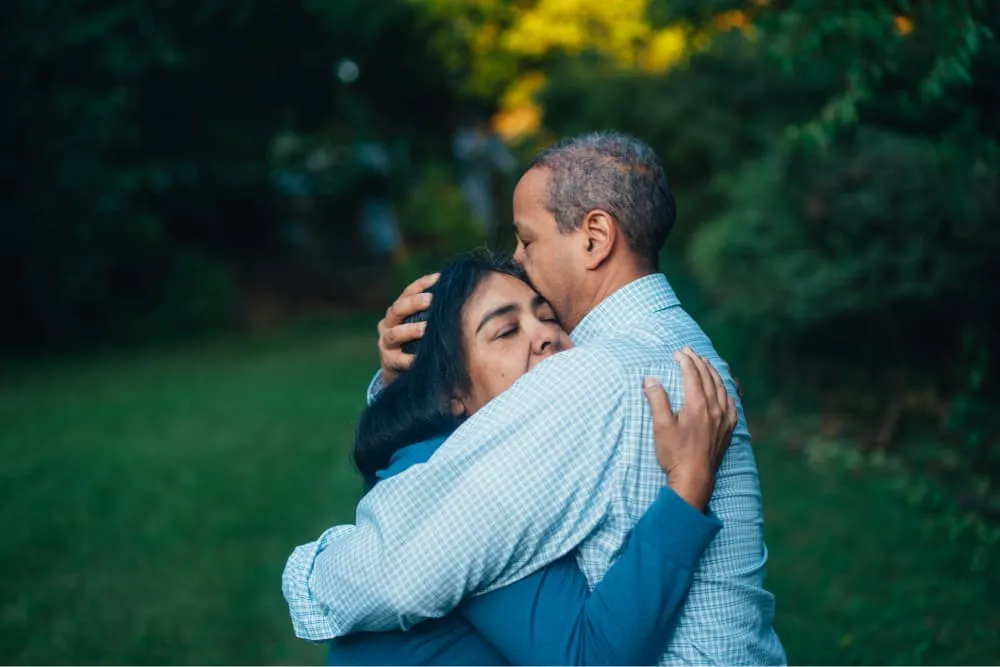How does eating disorder therapy help?
Therapy for eating disorders helps provide patients with different ways of reflecting on their thoughts and actions. A therapist or form of therapy can help bring new perspectives to the patient, allowing them the chance to better understand their own motivations and address them. This can help the patient grow, move on, and heal from unhelpful thoughts and behaviors.
In addition, many types of therapy allow co-occurring mental health disorders to be treated alongside the eating disorder. Depression, anxiety, low self-esteem, and other mental health concerns often co-occur with eating disorders and work to drive the conditions. Being able to address these issues at the same time as addressing the eating disorder itself can significantly improve the chances of healing.
Some therapy options are also designed to help someone continue to thrive long after they've left active treatment. For example, aftercare programs and support groups can provide long-term outlets to air concerns, look out for triggers, and remain accountable to recovery.
A remote program tailored to you

Online therapy sessions

Meal kit deliveries

Remote vitals monitoring
We will help get the most out of your insurance.
Different therapies for eating disorders
How to treat eating disorders in therapy depends on the person going through the experience and their individual history and journey. In that sense, the best therapy for eating disorders is the kind that's going to help someone best address their physical, mental, and emotional needs.
Just as people don't learn in the same ways, people also don't heal in the same ways. So different combinations of these common therapies for eating disorders may be helpful for each individual.
And regardless of the state of you or your loved one's mental illness, it's important to remember that every eating disorder is treatable. And at Within Health, online eating disorder therapy is always available.
Art therapy
Art therapy utilizes creative outlets, such as drawing, painting, music, dance, and even acting, to help someone better channel the feelings surrounding their condition.
Bypassing the more "logical" mind can help someone tap into or identify some of the emotions that are underpinning their mental health conditions. This type of therapy for eating disorders can also help people who may not feel comfortable with psychotherapy or have trouble verbally expressing themselves.
2
Cognitive behavioral therapy
One of the most widely-recommended types of eating disorder therapy,
cognitive behavioral therapy (CBT), hinges on the idea that our thoughts ultimately influence our actions. It works to help stop unhelpful behaviors by first stopping—and, eventually, changing—unhelpful thoughts.
Patients involved in CBT are also taught new, healthier coping mechanisms, to help them better manage their emotions or emotional triggers moving forward.
Enhanced cognitive behavioral therapy (CBT-E) is one of the most effective therapy types for eating disorders. It addresses underlying psychological and behavioral issues.
3
Dialectical behavior therapy
The core of
dialectical behavior therapy is based on CBT, with the technique intended to identify and change destructive disordered eating behaviors. But the overarching philosophy of DBT is that two things can be true at once.
In the case of someone with an eating disorder, these things usually are: The person is deserving of love and should seek self-acceptance; and the person can still work to change dangerous or disordered behavior.
4
Exposure therapy
Exposure therapy aims to help people overcome certain deep-seated fears, using repeated interaction with the object, thought, or situation to help desensitize them to certain triggers.
When used as eating disorder therapy, it may expose patients to certain foods they fear, or potentially triggering situations, such as eating out in public, among other stressful or upsetting objects or scenarios.
Family therapy
A treatment modality and a particular form of group therapy,
family therapy incorporates several members of the same household. This type of psychotherapy utilizes group dynamics to help assess and address any potentially unhelpful patterns within the home.
Family therapy for eating disorders is most commonly recommended when the patient is young or still lives at home. Caregivers are generally given the information and empowerment to take over their child's diet until recovery progresses to the point where the child can start safely making their own food-based decisions.
5
Group therapy
Group therapy is a treatment modality that can take place in an in-patient or out-patient setting. It generally involves a group of people who may or may not know each other but are working on similar issues. Sessions are led by one or several trained therapists and may focus on specific themes or be more open.
6
This type of therapy for eating disorders can offer different benefits than those available in individual therapy, including exposure to different perspectives, and building a sense of community.
Interpersonal psychotherapy
Interpersonal psychotherapy is a treatment modality that addresses issues with someone's social interactions and personal relationships. Rather than focus on someone's past and how it may have led to an eating disorder, IPT concentrates on the present, and how someone's current social interactions may contribute to disordered eating behaviors.
7
More broadly, IPT is also often used when someone is going through a period of grief or transition—after losing a loved one, getting a divorce, or becoming a parent, for example.
Self-help or guided self-help therapy
Self-guided therapy for eating disorders is much as it sounds, coming with a workbook, app, or other pre-planned program for someone to follow independently. Many of these programs are based off of CBT, as this approach to eating disorder therapy is generally considered effective and already has a very structured design.
8
Still, even when patients use a self-help program, they're usually given information or opportunities to contact therapists or other program followers.
You may also be interested in:
Eating disorder treatment for your needs at Within
At Within, we're here for you every step of the way, no matter your initial assessment or therapeutic needs.
Our knowledgeable care team understands the differences and benefits of these and many other types of therapy and can help you create an individualized treatment plan catered to your specific condition, health, and best outcome.
Everything from meal kits to experiential outings and after-hours support is accounted for in your personalized schedule. And our team can also help coordinate insurance to ensure you can participate in the program fully and confidently.
Most importantly, it's crucial to remember that it's never too late to seek help. The road to recovery can be difficult, but a healthier and happier life is always possible.
























































